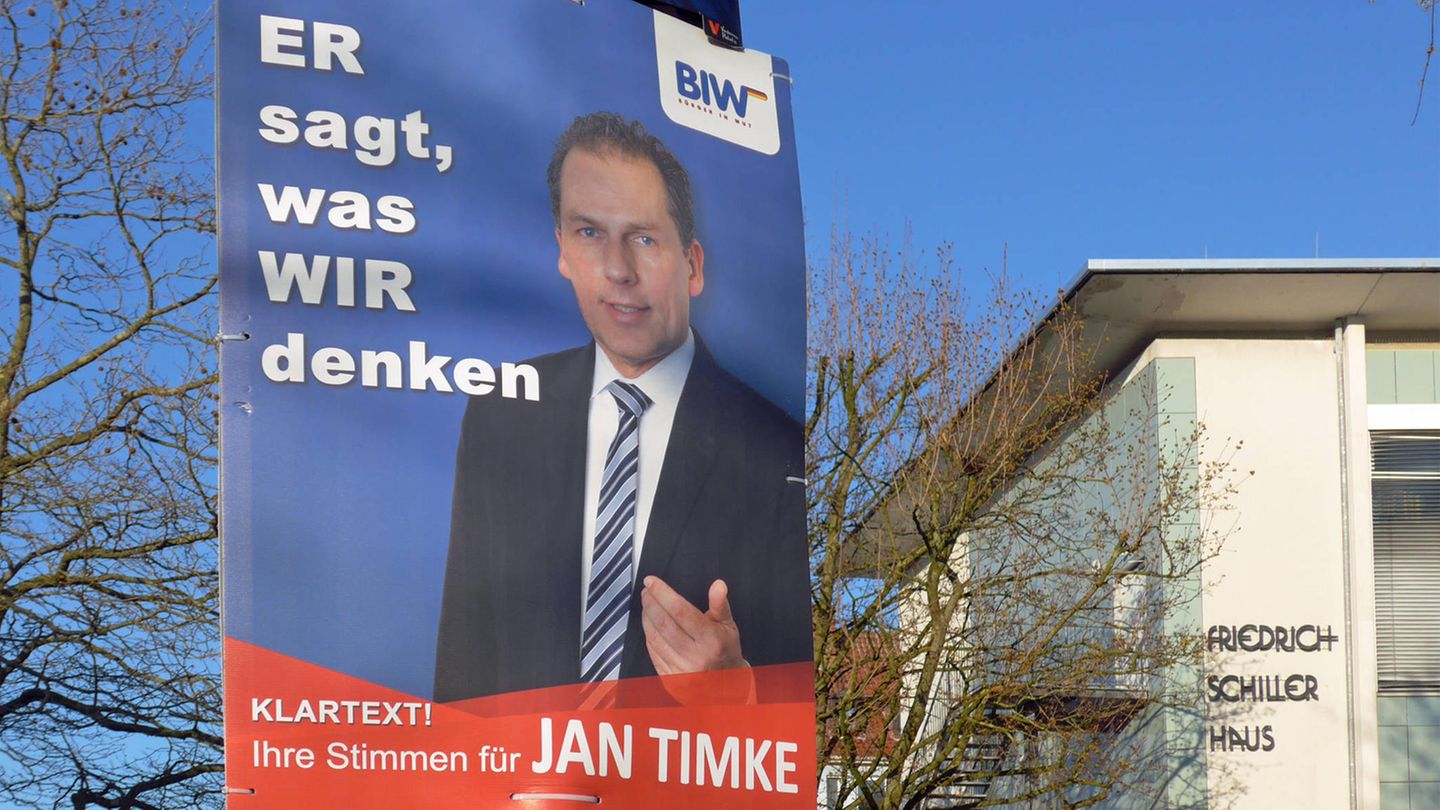The “Citizens in Anger” got almost ten percent of the votes in the state elections in Bremen. The party benefited from the AfD’s exclusion from voting – and yet those responsible see the result as an incentive for greater tasks. Who are the “citizens in a rage”?
Their color is blue – and that’s not the only thing that the Bremen party “Bürger in Wut” (BiW) and the AfD have in common, even if the former are sometimes more, sometimes less, trying to differentiate themselves.
One thing is certain: The BiW achieved a great success in the state elections in the Hanseatic city. According to the latest projections, the party received9.6 percent of the votes. They are the winner of the election. The BiW recruited their electorate to a considerable extent from supporters of the AfD. According to a voter migration analysis by Infratest-Dimap on behalf of ARD, around 7,000 people who ticked the AfD four years ago voted for BiW this year.
“Citizens in anger” has been active in Bremen for a long time
The AfD was not allowed to take part in the general election because it had set up two lists – many of its voters apparently found a new political home with the BiW, after all the slogans and behavior of the two parties are the same. Above all, internal security is a core concern for the BiW – and everything that, in their view, belongs to it, for example drug or migration policy. “Consistently deport stabbers” was an election slogan.
proposals failed
The (never)ending story of the AfD candidates for the Bundestag presidium
The BiW program for the Bremen election sometimes reads like one angry Reckoning with the previous policy, some excerpts:
- “The parties have made the state their prey”
- “Latent trivialization of left-wing radicalism by the red-red-green Senate”
- “We reject the use of gender language by public administration in communication with citizens”
- “Rapid deportation of foreign criminals and repeat offenders to their countries of origin”
- “Owners of legal weapons such as hunters or sport shooters must not be placed under general suspicion or harassed by the state”
- “Uniform school uniforms in the state of Bremen to strengthen the sense of togetherness among the children and young people”
- “We want to abolish the Bremen environmental zone”
- “We oppose the attempts by the SPD-led Senate to make motorized private transport a scapegoat and to harass drivers with ever new restrictions.”
“In terms of content, the BiW (…) unite right-wing conservative, right-wing populist and economically liberal positions,” summarizes the Federal Agency for Civic Education the party program. But the party is committed to “the constitution of the Federal Republic without relativizing central components of the free-democratic basic order.” In this respect, the BiW play no role in the report on the protection of the constitution by the state of Bremen – in contrast to the AfD. BiW top candidate Piet Leidreiter is also trying to keep his distance from the AfD. One expressly does not see oneself as an alternative to the AfD, which was not allowed to vote in Bremen. Rather, one sees oneself as an alternative to the CDU and FDP, he told the “Weser-Kurier”.
In view of their election results, the BiW are in the national limelight for the first time. In the state of Bremen, on the other hand, the party is no longer unknown. The German city-states, above all Bremen and Hamburg, flush protest parties to the top with all regularity, and the BiW are no exception.
The party emerged from the ruins of the Rechtsstaate Offensive (“Schill Party”) party, which was founded in 2000 by the former magistrate Ronald Schill to really clean up in Hamburg. Above all, however, the “Schill Party” attracted attention through the escapades of its founder and chairman. After brief federal political ambitions, it increasingly fell apart again from 2004 – and the policeman and then state party chairman Jan Timke also had to look for a new political home after the dissolution.
In 2025, the entry into the Bundestag should succeed
With other comrades-in-arms, he founded the voters’ association “Bürger in Wut”. In 2007 she was able to get into the Bremen parliament right away, which was made possible by a special feature in the electoral law there. Anyone who clears the five percent hurdle in Bremerhaven gets a seat in parliament, regardless of how the party performs in the entire state, i.e. in Bremerhaven and Bremen. In 2011, 2015 and 2019, the BiW succeeded in gaining citizenship in this way. Timke calls his party a “reservoir for the dissatisfied.”
In 2023, the BiW were not only able to score in Bremerhaven. There it even reached 22.4 percent, in the city of Bremen it was 7.5 percent, the bottom line is said to be 9.6 percent, around 24,000 Bremen residents citizens in anger. Participation in the government in the Free Hanseatic City is ruled out, but the party wants more: 2025 should succeed in entering the Bundestag.
For this purpose, the party merged in March 2023 with the “Bündnis Deutschland”, a small conservative party that is represented by defectors in the European Parliament and in the state parliaments of Hesse, Bavaria and Saxony. “Bündnis Deutschland” boss Steffen Große believes that the BiW must change so that successes can be celebrated nationwide. “There was a time when this anger pointing was helpful,” he told the “Frankfurter Allgemeine Zeitung”. He apparently considers this time to be over and holds out the prospect of a constructive policy, for example on services of general interest in rural areas. After the election in Bremen, he said: “We are a serious prospect capable of forming a coalition.” On the occasion of the founding of “Bündnis Deutschland” last November, ZDF wrote of a “déjà vu with the early AfD”.
Sources: , , , , , , DPA news agency
Source: Stern
I have been working in the news industry for over 6 years, first as a reporter and now as an editor. I have covered politics extensively, and my work has appeared in major newspapers and online news outlets around the world. In addition to my writing, I also contribute regularly to 24 Hours World.




